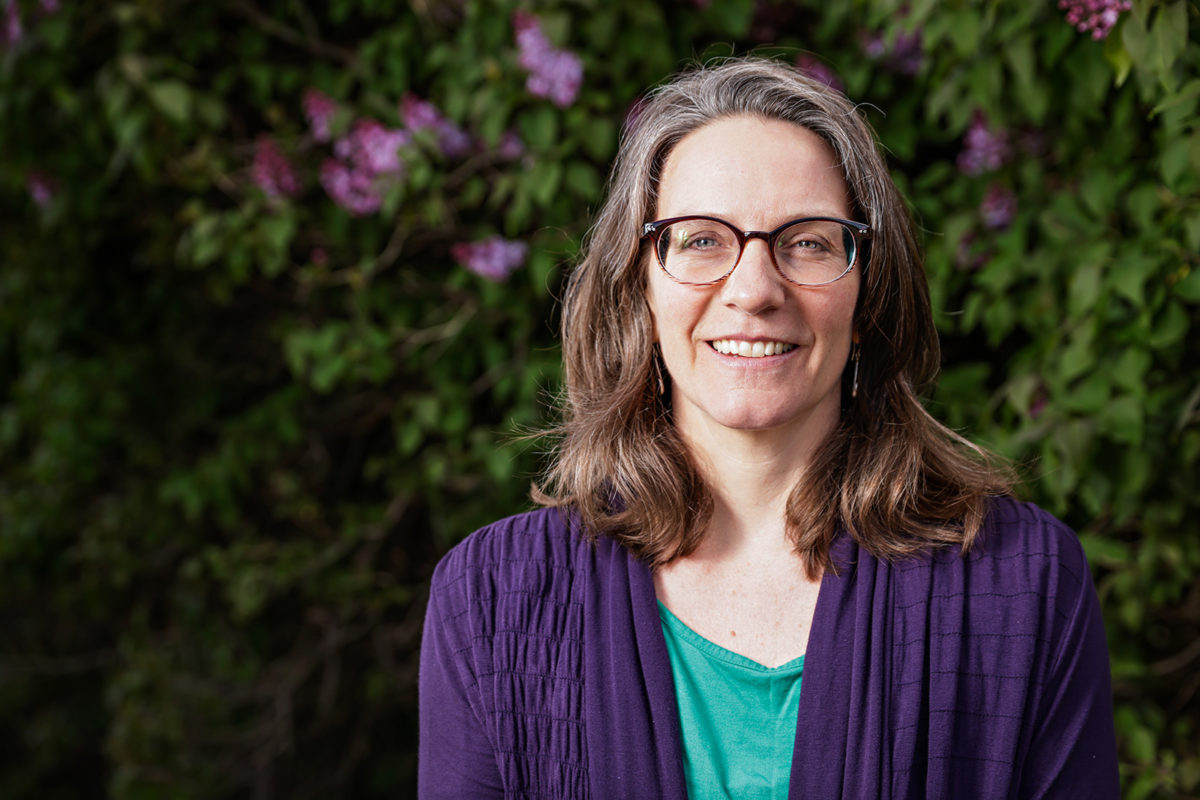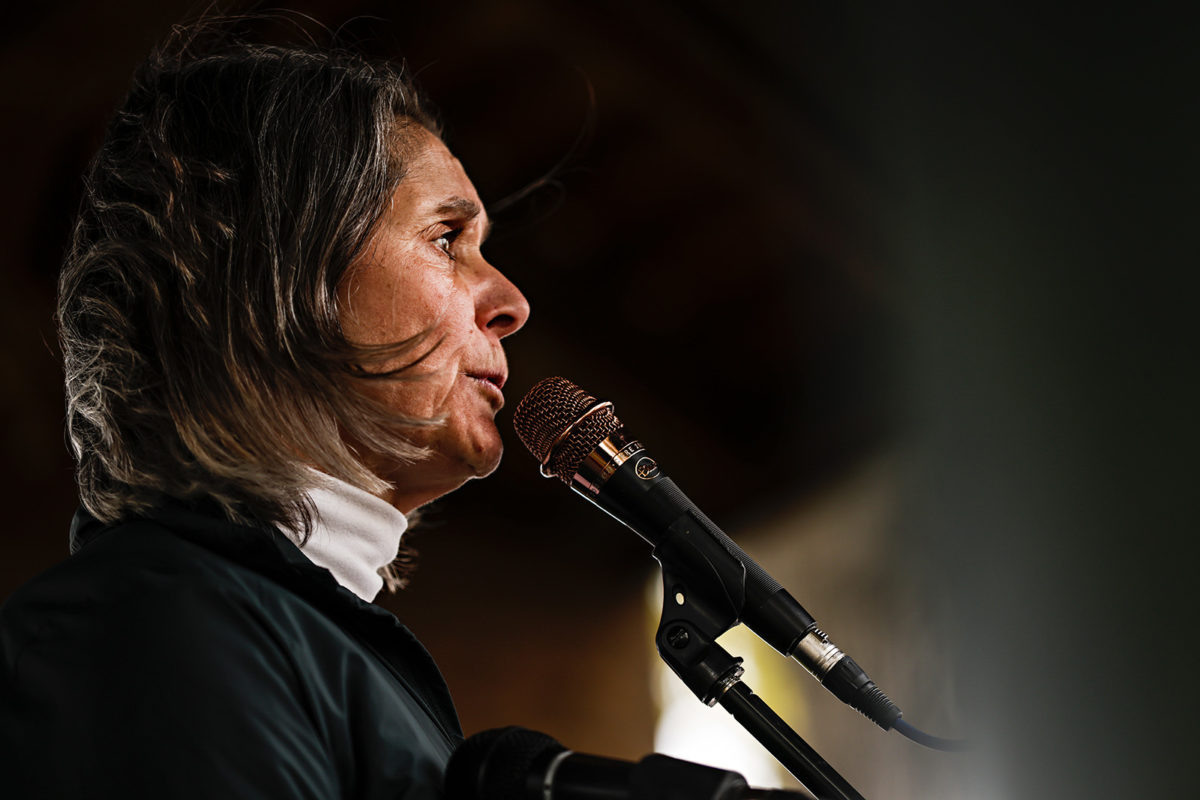Local Abortion Providers Shift into New Reality
Abortion providers in Northwest Montana say their patients are scared, panicked and confused as they prepare for nationwide access restrictions following the Supreme Court draft leak that would overturn Roe v. Wade
By Maggie Dresser
Shortly after a Texas bill passed last September that limits abortion services beyond six weeks of pregnancy, Whitefish abortion provider Helen Weems saw a patient who traveled from Texas seeking her services in Montana.
While the woman and her family had already planned to travel to the Whitefish area for unrelated reasons, she sought an abortion from Weems more than 1,000 miles from her home state where she could not legally obtain services.
Weems has provided abortions since she began her practice at All Families Healthcare in 2018, which reopened following a vandalism incident four years prior under a different provider, working with patients on every level of the emotional spectrum. But this patient was different.
“It was significant to me how much more anxiety she had around this pregnancy and her decision because she had been living in that environment of pregnancy trauma,” Weems said. “There’s so much anxiety around the restriction of their options and that creates panic. She was scared. She was panicked in a way that I haven’t seen. I usually see patients making decisions in a greater state of calm and her level of panic felt very different.”
Conservative states like Texas and Oklahoma were already chipping away in their state legislatures to restrict abortion, even before the Supreme Court draft that would overturn Roe v. Wade was leaked, which would leave abortion laws up to individual states.
While abortion remains legal in Montana with very few limits despite Republican legislators’ attempts to restrict access, Weems says her patients are scared. She receives phone calls from people who are fearful, panicked and confused.
“I think there’s so much confusion about whether abortion is still legal in Montana,” Weems said. “What gets coverage is the Supreme Court leak, but many don’t understand the nuances of the laws recently signed by the governor … It creates fear. There are a lot of calls from people who are scared that they might be forced to have a baby when they know it’s not the right time.”

During the last legislative session in Montana, Republican Gov. Greg Gianforte signed four bills restricting abortion access, which restrict telehealth, shorten the gestation period of legal abortions to 20 weeks and require unnecessary steps like an ultrasound and in-person visits, all creating access barriers.
After the bills were signed, Planned Parenthood of Montana filed a lawsuit challenging all four, arguing they are unconstitutional and violate Montana’s protection to the right to privacy. A Yellowstone County District Court judge issued a preliminary injunction for three of the bills last year.
Despite the seemingly nonstop cycle of lawsuits, abortions will remain legal in Montana in at least the short term due to the state constitution’s strong right-to-privacy clause.
If the Supreme Court decides to overturn Roe v. Wade as the leaked draft suggests, 13 states have trigger laws that will automatically ban abortion, which includes Idaho, Wyoming, North Dakota and South Dakota, which all surround Montana.
States where abortion remains legal will likely see an influx of patients, Weems says, which is already happening in the South where some states recently passed new laws restricting abortion.
Since Whitefish is in an isolated corner of northwest Montana, Weems’ patients are typically local or they travel from the Blackfeet Indian Reservation, so she doesn’t expect a huge spike in demand. With abortion clinics in Missoula, Helena and Billings, and telehealth in Great Falls, she expects those will see a greater volume of patients before All Families does.
Joey Banks, a Missoula-based abortion provider and former chief medical officer at Planned Parenthood in Billings, doesn’t expect a surge in Montana if Roe v. Wade is overturned. Since there are already few abortion clinics in states surrounding Montana, she says many residents in neighboring states have already been traveling to Montana for services long before restrictions were enacted.
“We don’t expect a major surge in Montana,” Banks said.
Banks provided abortions at Planned Parenthood in Billings for two years before resigning last year and she says she was already seeing patients from North Dakota, Idaho or Wyoming on a regular basis.
Since Banks resigned in December, she has been working as a contractor, traveling mostly to Oklahoma. But since Oklahoma’s state legislature passed a bill restricting abortion at fertilization last month, she’s only able to provide abortion follow ups now.
Like Weems, Banks has noticed confusion among patients and medical providers. Those seeking abortions are worried law enforcement officials will hunt them down and search for their abortion pills and people in Texas are worried providers and anyone aiding in an abortion will be arrested and charged.
“They are pretty scared,” Banks said.

Since travel will be necessary for people in states with trigger bans if Roe v. Wade is overturned, providers say this will create financial barriers for the most vulnerable people.
“What we’re going to see is a real disparity in who gets to have an abortion and who doesn’t,” Weems said. “Those with the fewest resources will be forced into parenthood. Forcing a woman to deliver when she’s seeking an abortion pushes her further into poverty and pushes her children into poverty. We don’t have the associated social safety net to support those families.”
Weems says many of her patients choose abortion because they don’t have the financial resources to raise a child and she’s concerned childhood poverty rates will increase along with the added trauma and stressors of being raised in that environment.
“I hear the same story over and over,” Weems said. “People say, ‘I love my children, I want the best for my children, and I can’t afford to raise another child.’ What I hear in that statement is a deep love for our collective children and a concern for their welfare. In the abortion care that I know, abortion is a loving choice and so I don’t understand when I hear legislators and justices talking about violence or selfishness or the lack of regard for human life.”
As abortion access becomes more restricted, Weems wants to see better access to housing, food security, job security and healthcare.
Susan Cahill, a retired physician’s assistant and abortion provider in the Flathead Valley, provided services for more than 40 years and says she doesn’t see Montana’s current Legislature doing anything to help mitigate financial burdens for vulnerable families.
“All of the people who are supposedly pro-life don’t support parental leave, a minimum wage that can support families, they don’t support sex ed,” Cahill said. “They don’t support anything that makes abortion less necessary.”
Cahill moved to the Flathead in the 1970s to work with Dr. Jim Armstrong, an abortion provider who witnessed women dying daily of illegal, botched abortions in New York City before Roe v. Wade made the procedure legal.
In the decades that she provided services, Cahill saw patients from all walks of life while anti-abortion protestors stood outside her office in Kalispell every day.
Cahill says she performed abortions for the same picketers who protested outside of her office, including a teenager who was on the cover of a local newspaper two weeks later for promoting abstinence until marriage.
Another time, a young woman who often protested with her church came to see Cahill after becoming pregnant.
“Her church found out and they all had signs with her name on them outside our door,” Cahill said. “Dr. Armstrong lead her out the back door afterwards and hiked her over the fence so they wouldn’t see her.”
Cahill’s other former patients include 13-year-old victims of rape and incest and survivors of domestic violence.
“This is real life versus politics,” Cahill said.

Now 72, Cahill retired in 2014 after her clinic, which has now been taken over by Weems, was vandalized by an anti-abortion activist. Weems, who is an advanced practice registered nurse (APRN), approached her a few years later and asked Cahill to train her to provide abortions and she restarted All Families Healthcare in 2018.
“This whole region suddenly lacked abortion services,” Weems said. “It was a big deal in the reproductive health community … It was clear there was a gaping hole in the safety service net and there was no abortion care.”
Since Weems is an APRN, she was not legally able to provide abortions under Montana’s state law. But The Center for Reproduction Rights and the American Civil Liberties Union of Montana requested a preliminary injunction on her behalf, which was granted, and she’s been providing abortions ever since. In February, the state permanently blocked the law that prevented APRN’s from providing abortion care, allowing Weems to continue her practice.
“If there’s any hope, the pendulum may swing back toward a more representative democracy,” Weems said. “It’s so skewed right now toward the will of this vocal minority.”
For Cahill, she didn’t think the reversal of Roe v. Wade would ever happen.
“The thing that’s most upsetting to me is what’s happened to the Supreme Court,” Cahill said. “To me, Roe v. Wade was the law of the land. Now it feels like there’s no law in this land.”